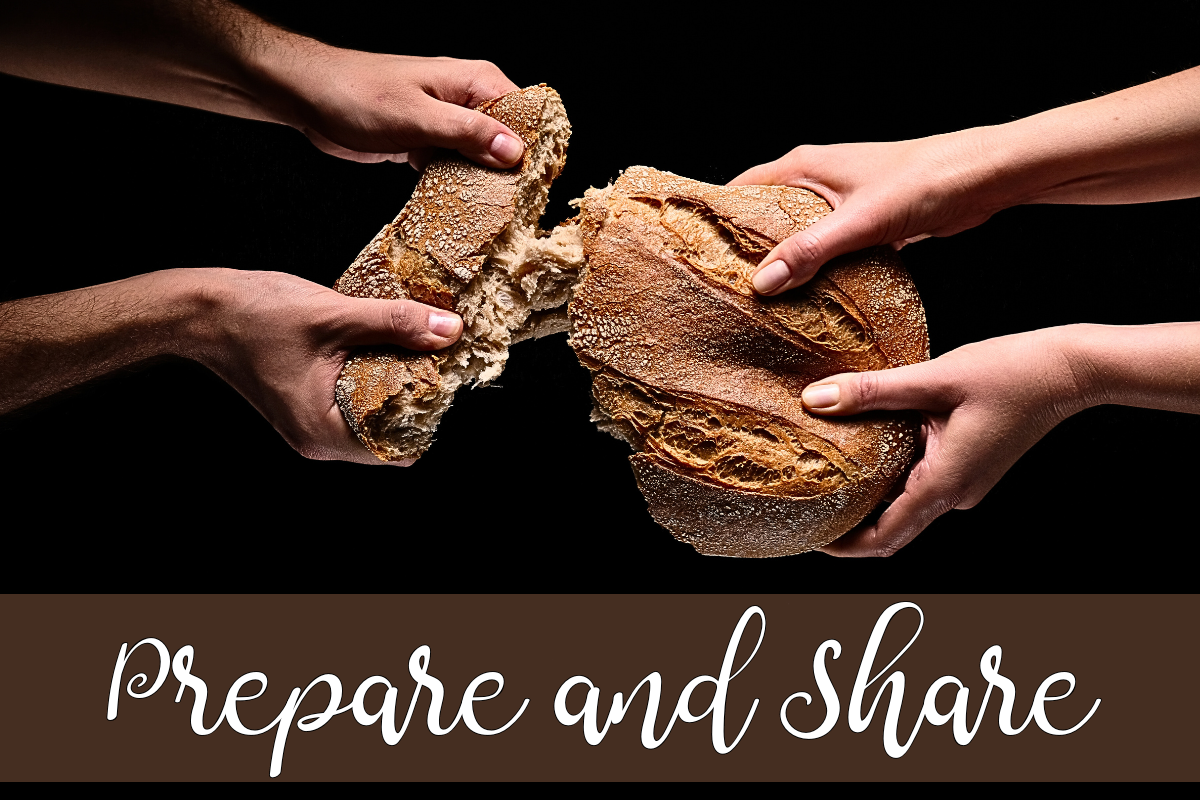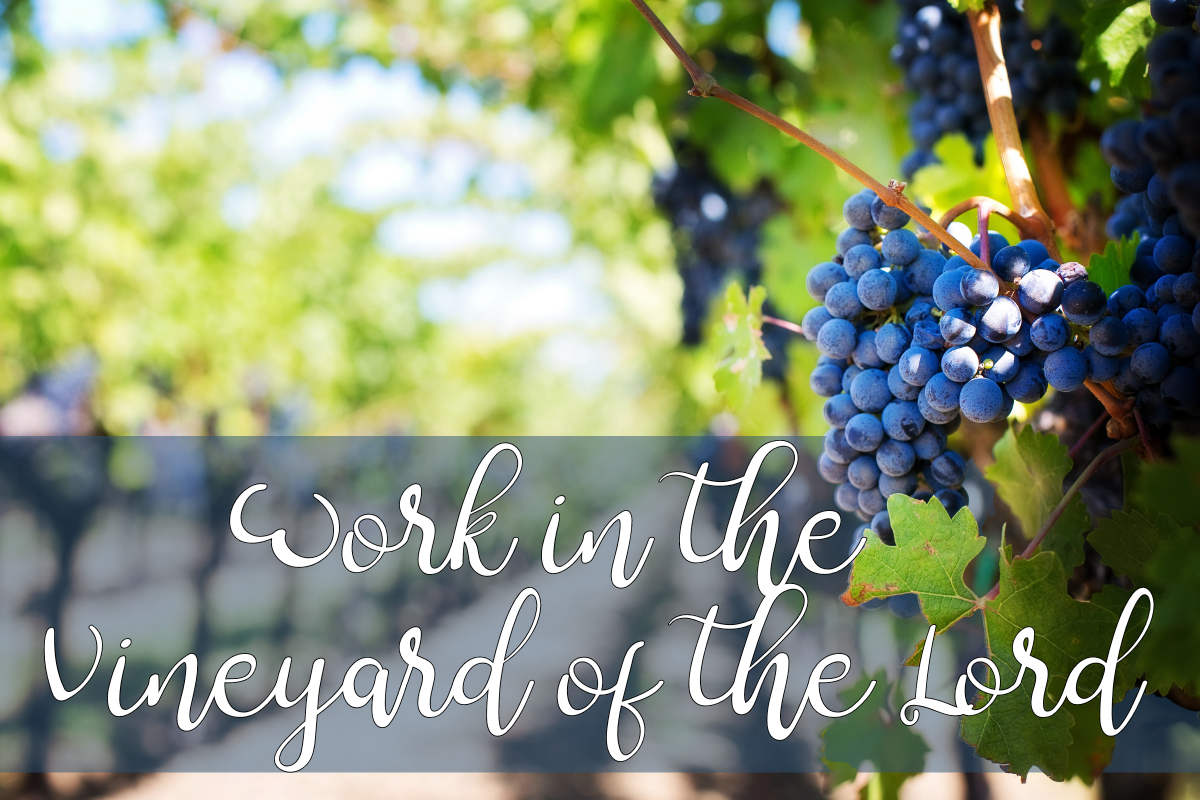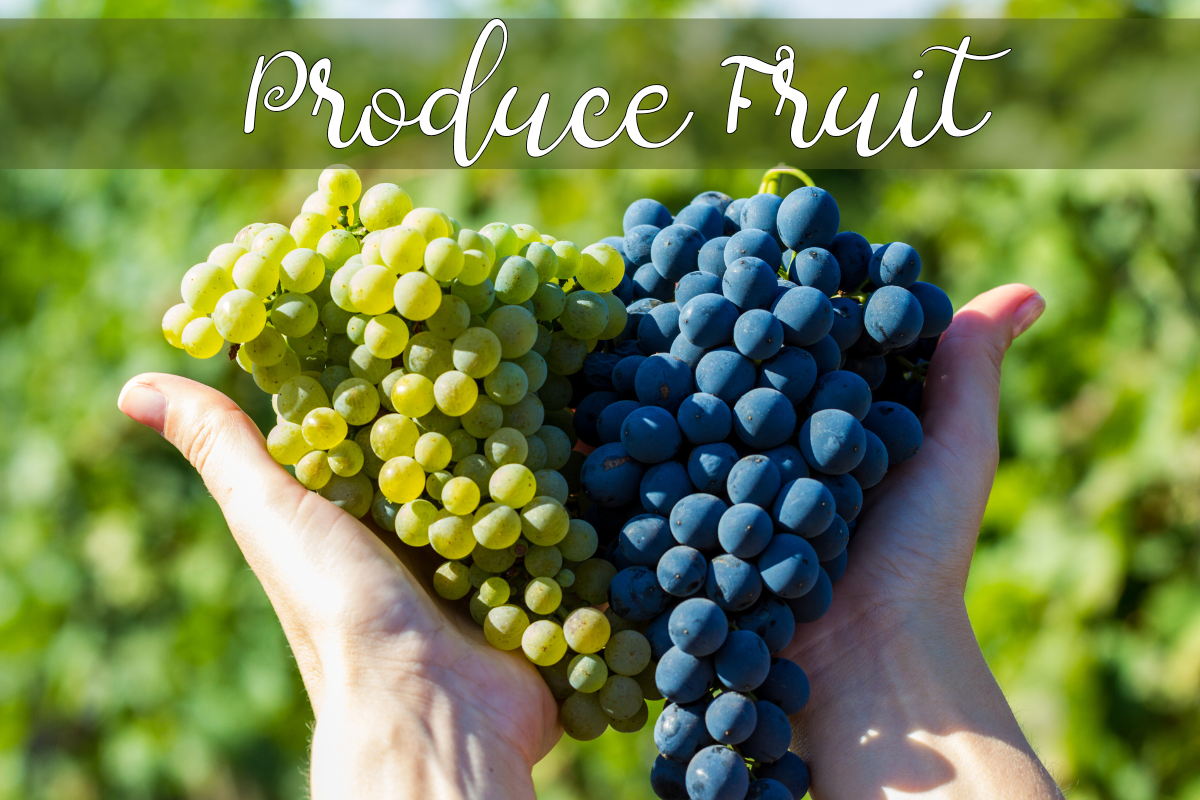Week Beginning October 29, 2023
Serve Out of Love
Love gives us the reason to do every good work we accomplish. Love gives us the ability to bear every good fruit we produce. Saint Francis de Sales explains: “The good man is like a tree planted by the water-side that will bring forth its fruit in due season, because when a soul is watered with charity, it brings forth good works seasonably and with discretion.”
Our Gospel reading this Sunday teaches us that love is also the greatest commandment (Matthew 22:34-40). In this passage, the Pharisees ask Jesus which one of their more than six hundred laws is the most important. Jesus draws upon Deuteronomy 6:5 and responds, “You shall love the Lord, your God, with all your heart, with all your soul, and with all your mind. This is the greatest and the first commandment” (Matthew 22:37-38). He continues by referring to Leviticus 19:18 saying, “The second is like it: You shall love your neighbor as yourself. The whole law and the prophets depend on these two commandments” (Matthew 22:39-40).
We are created to participate in two dimensions of this one great love. First, God sends down His infinite love to fill up our hearts. The Reverend Thomas à Kempis describes: “Nothing is sweeter than love, nothing stronger or higher or wider; nothing is more pleasant, nothing fuller, and nothing better in heaven or on earth, for love is born of God and cannot rest except in God, Who is above all created things.” We reciprocate by offering up all that we have, including our love for Him. Saint Augustine muses: “To fall in love with God is the greatest romance; to seek Him the greatest adventure; to find Him, the greatest human achievement.”
Second, we freely exchange love, perform good deeds, grant forgiveness, and live in harmony with our neighbors. Saint Paul reminds us to “Do nothing out of selfishness or out of vainglory; rather, humbly regard others as more important than yourselves, each looking out not for his own interests, but [also] everyone for those of others” (Philippians 2:3-4).
Our cross of love is formed when our vertical love with God intersects with our horizontal love with each other. Just as the wooden beams of the crucifix must remain in balance to form a stable cross, so must our love stay balanced to be strong. And just as Jesus hangs on the center of the crucifix, so does he join divine love with human love. Jesus brings God to us as the Word Incarnate. Jesus brings us to God through his Passion, death, and resurrection. While hanging on that cross, he exhibits his unwavering love for both God and man and sets the ultimate example of how to love.
Because we are made for love, the commandments to love are revealed to help us flourish. God loves us because of who He is, not because of who we are. Saint John teaches us that “love is of God” and “God is love” (1 John 4:7-8). We are only able to give freely what we have received from God. Therefore, we are only able to give love because God loves us first (1 John 4:19).
Although God does not need our love, we need to love Him. When we love God above everything else, our passions and our lives are properly ordered. Our hearts are set ablaze with God’s love, and we are able to use our gifts as God intended. When we prioritize anything else over God, we lose our way. Our love becomes distorted, our lives lose their meaning, and our hearts are eventually left broken and empty.
More than just loving God with all of our heart, we are instructed to love Him with all of our soul and all of our mind. That means we can choose to participate in God’s love, or we can turn away from His invitation. “When people choose to withdraw far from a fire, the fire continues to give warmth, but they grow cold. When people choose to withdraw far from light, the light continues to be bright in itself but they are in darkness,” observes Saint Augustine. He warns, “This is also the case when people withdraw from God.”
When we open our hearts to God’s love, that love transforms us. We are enabled to love others with the power of God’s love in the way that Jesus shows us. We begin to love what He loves by recognizing the inherent value of every person, created in His image (Genesis 1:27). We walk with others on their journey, sharing in their trials, forgiving their trespasses, and supporting their potential. Our love becomes active, welcoming, merciful, generous, genuine, enduring, and at times sacrificial. Meeting someone in need is like finding a hidden treasure, and loving others becomes our privilege. “Yet, if we love one another, God remains in us, and his love is brought to perfection in us” (1 John 4:12).
Saint Augustine says, “Christ is not valued at all, unless he is valued above all.” This week, take inventory of your loves. What tops the list in your heart, soul, and mind? Do your actions reflect your priorities? Saint Vincent Ferrer gives us sage advice: “If you truly want to help the soul of your neighbor, you should approach God first with all your heart. Ask him simply to fill you with charity, the greatest of all virtues; with it you can accomplish what you desire.”
Week Beginning October 22, 2023
Prepare and Share
We begin this week with a famous quote of Jesus taken from the Gospel According to Matthew: “Then repay to Caesar what belongs to Caesar and to God what belongs to God” (Matthew 22:21). Jesus explains that the coin used to pay the taxes, which bears the image of Caesar, belongs to Caesar. As Christian stewards, we focus greatly on the latter part of his quote. Understanding that we are made in the image of God (Genesis 1:27), it stands to reason that we are called to give our very selves to God our Creator.
God is imprinted on every human heart and every human soul. Each one of us bears some likeness to Him. Through each one of us, therefore, God reveals something unique about Himself. Together, we combine our individual gifts for the benefit of all, recognizing that every talent has an associated task that contributes to God’s plan. Saint Catherine of Siena relays: “God said to me, ‘I could well have made human beings in such a way that they each had everything, but I preferred to give different gifts to different people, so that they would need each other.’”
By helping one another, we multiply the good by sharing the good. However, we risk losing everything if we fail to use it. In one of our Gospel readings this week, Saint Luke introduces us to the rich fool who hoards all of his treasure for himself (Luke 12:13-21). The fool, rich in all things but those that matter most to God, stores away his worldly goods without considering how he could use them to carry out God’s will. He dies suddenly after his selfish toils, wasting his worldly possessions which can no longer console him.
We might look to the rich fool and think that he is prudently preparing for his future. Through the parables we are studying, Jesus shows us that being prepared does not mean stockpiling material things for our own use on this earth. Being prepared necessitates readying ourselves for eternal life where those types of goods have no value. Preparing involves wearing the garment of charity, daring to try despite fears and obstacles, bearing the fruit that will remain, sharing our gifts out of love, and caring for others and for God.
In our readings this week, Saint Luke also tells us about the vigilant and faithful servants (Luke 12:35-48). Blessed are the servants who complete the will of the master in his absence, who serve him diligently and are prepared for his return. Jesus ends the story with the expectation that “Much will be required of the person entrusted with much, and still more will be demanded of the person entrusted with more” (Luke 12:48). Here we learn that our actions are measured in proportion to our gifts, not in comparison to others.
This is a liberating lesson in stewardship. We are encouraged to focus on cultivating the abilities we have, rather than finding faults in that which we lack. Saint Francis de Sales simply states, “Do not wish to be anything but what you are, and try to be that perfectly.” What we do with our talents is of greater importance than the quantity or quality of our particular skills. Pope Saint John XXIII inspires us to “Consult not your fears but your hopes and your dreams. Think not about your frustrations, but about your unfulfilled potential. Concern yourself not with what you tried and failed in, but with what it is still possible for you to do.”
Our lesson also contains a warning not to compare our efforts with those of others. We may not know the extent of our neighbor’s gifts and responsibilities. Do not become complacent by thinking that you are doing more than everyone else; do not become despondent by thinking that you can never match the accomplishments of others. Just do the best you can do using everything that you are given. “And since we have gifts that differ according to the grace given to us, let each exercise them accordingly” (Romans 12:6).
This week, evaluate how you prepare and share. Are you planning so much for this life that you neglect preparation for the afterlife? How are you using your special strengths to benefit others and to build the Kingdom of God? Pope Saint John Paul II reminds us that “None of us is alone in this world. Each of us is a vital piece of the great mosaic of humanity as a whole.” Reflect on how you fit as a living stone in God’s beautiful creation.
Week Beginning October 15, 2023
Work in the Vineyard of the Lord
In the 2003 Pastoral Letter on Stewardship, the United States Conference of Catholic Bishops asserts: “Work is a fundamental aspect of the human vocation. It is necessary for human happiness and fulfillment. It is intrinsic to responsible stewardship of the world.” Saint Francis de Sales observes: “We all have a vocation. We believe that God has placed us in this life to fill a special need that no one else can accomplish.” The Catechism of the Catholic Church teaches us that “In work, the person exercises and fulfills in part the potential inscribed in his nature (CCC 2428). Saint Teresa of Calcutta explains, “I can do the things you cannot, you can do things I cannot; together we can do great things.”
One of the greatest things we can do through our work is to partner with God for a divine and human collaboration in creation. In his encyclical Laborem Exercens, Pope Saint John Paul II notes that “Work is one of the characteristics that distinguish man from the rest of creatures.” He states: “The Christian finds in human work a small part of the Cross of Christ and accepts it in the same spirit of redemption in which Christ accepted his Cross for us.“ He continues: “Let the Christian who listens to the word of the living God, uniting work with prayer, know the place that his work has not only in earthly progress but also in the development of the Kingdom of God, to which we are all called through the power of the Holy Spirit and through the word of the Gospel.”
Our service as Christian stewards is likened to working in the vineyard of the Lord. Doing so requires discerning our unique talents and using them for the glory of God. Saint John Vianney provides simple guidance: “Here is a rule for everyday life: Do not do anything which you cannot offer to God.” Working in the vineyard of the Lord means being spiritually alive, bearing choice fruit through righteous deeds, and clothing ourselves with Christ (Galatians 3:27). More than having faith and linking our toils to the plan of salvation, it necessitates answering His call, cooperating with His grace, and doing His will.
This cannot be accomplished without obeying God’s commandments, especially the commandments to love God and each other. Through love, we are conformed to God. For love, we are compelled to act on His behalf. When human love meets divine love, the vineyard thrives and burgeons with new growth.
Let’s pause for a moment to reflect on obedience, which is often overlooked in our modern world. It is important to understand that God’s commandments are handed to us out of love to help direct us toward human flourishing. If you were to purchase a very expensive cloak and the label says “dry clean only,” you probably wouldn’t toss that coat into the washing machine. You would likely obey the instructions, because you want to protect and preserve the garment. So much more than caring for that piece of clothing do we need to care for our eternal souls. Obeying God’s care tags helps us to keep our souls pure. When that fails and we need a refresh, the Lord institutes the sacraments to cleanse and restore us. God wants to shield us with salvation and dress us in the righteousness of Christ. Saint Paul summarizes:
“But since we are of the day, let us be sober, putting on the breastplate of faith and love and the helmet that is hope for salvation. For God did not destine us for wrath, but to gain salvation through our Lord Jesus Christ, who died for us, so that whether we are awake or asleep we may live together with him. Therefore, encourage one another and build one another up, as indeed you do” (1 Thessalonians 5:8-11).
Charity is woven into the uniform worn by the disciples of Christ. As we learn in our Gospel reading this Sunday (Matthew 22:1-14), it also comprises the fabric of the garment required for the great wedding feast. We learn that the Parable of the Wedding Feast is a metaphor for the messianic banquet enjoyed with Christ in heaven as foretold in our first Sunday reading this week (Isaiah 25:6-10a). With Jesus as the bridegroom and the Church as the bride, “We are all invited to be the Lord’s guests, to enter his banquet with faith,” reveals Pope Benedict XVI, “but we must put on and take care of the wedding garment: charity, to live in the profound love of God and neighbor.” Saint Gregory elaborates: “Therefore each one of you in the Church who has faith in God has already taken part in the wedding feast, but cannot claim to wear the wedding garment unless he jealously guards the grace of love.”
At the close of the parable, Saint Matthew shares Jesus’ warning that “Many are invited, but few are chosen” (Matthew 22:14). This week, take that caution to heart. What is your response to God’s invitation? Are you open to receiving His grace? Are you properly disposed for it? Is your work in the vineyard motivated by love “from a pure heart, a good conscience, and a sincere faith” (1 Timothy 1:5)? What changes can you make now so that you are always properly attired?
Week Beginning October 8, 2023
Produce Fruit
We open our readings on Sunday with a passage from the Book of Isaiah (Isaiah 5:1-7). We are introduced to someone who spares no expense and is meticulous with every detail to cultivate a fertile vineyard. Despite all of his careful efforts, he reaps only wild, rancid grapes. We learn that the Lord is the vineyard owner, the house of Israel is the beloved vineyard, and the people of Judah are the cherished plant. God provides a privileged paradise for His chosen people to produce rich fruit, to live in righteousness and justice, and to spread that bounty throughout the land. When they take God’s gifts without using them for good and when they live sinful lives that pull them away from God, He recalls His gifts and enacts His punishment.
It is important to note that despite the harsh ending to this story, the original plan is crafted with love, and God’s corrective actions are necessary to lead His people to redemption. Sin may cause death, but death does not have the final word in the story of salvation.
Fast forward to our Sunday Gospel reading, the Parable of the Tenants (Matthew 21:33-43). The setting is similar: the landowner lavishes a most spectacular, fully-equipped vineyard for lease to his tenants. In this story, the tenants express no gratitude for the bounty allotted to them. Rather, they wickedly attack the servants who come to collect the owner’s portion. The landowner mercifully tries again, this time dispatching even more servants who are treated just as brutally. Finally, the landowner sends his son. Instead of treating the son with due reverence, they kill him, greedily hoping to gain his inheritance. The actions of the tenants are so egregious in this context that the chief priests and elders express justice in potentially sentencing them to death and leasing the vineyard to other tenants who provide the landowner with the produce due to him.
Here, the landowner is God, the vineyard is the nation of Israel, the tenants are the religious leadership and officials who reject those sent by God, the servants are the prophets, the son is Jesus, and the new tenants are the Jews and Gentiles who follow him. Jesus prophesies his own death as the Son of God, he references Psalm 118:22-23 to solidify his point using Biblical imagery, and he rebukes his audience for their failure to heed the message from God.
Saint John reveals to us that in our lives, God the Father is the vine grower, Jesus is the true vine, and we are the branches (John 15:1-17). The branches that fail to produce fruit are trimmed and burned. Only by staying connected to the vine can the branches bloom; only by staying connected to Jesus can we flourish. Following the commandments of Jesus–loving God and one another–keeps us connected and productive. God has great plans for us, and through His grace we can accomplish wonderful things. For even the branches that do bear fruit are pruned to yield yet more fruit.
Today, we view the Church as the new Israel (CCC 877). As tenants in the vineyard of the Lord, we are called to be prudent stewards of God’s bounty, to use our gifts for the benefit of others, and to return them with increase to the Lord. Saint Peter refers to the Christian faithful as “living stones,” encouraging us to offer spiritual sacrifices acceptable to God through Jesus Christ (1 Peter 2:4-9). We can worship God through the way we live our lives, dedicating our time, talent, and treasure for His glory. Living only for ourselves may provide fleeting satisfaction, but living for God produces eternal rewards.
Just as the chief priests and elders fail to initially recognize their shortcomings, we also have difficulty uncovering our own inclinations that separate us from the Lord like the wicked tenants. This week, think critically about your role as God’s tenant. Do you listen to His Word and obey His will, or are there some areas where your heart remains rebellious? Are you an active worker in the vineyard who produces fruit, or have you become complacent? Do you trust in God as you endure the pain of pruning, or do you stumble away from Him and risk being crushed to powder by the Stone? When the Lord looks to us to see how we carry out justice toward others, does He find love and compassion or “bloodshed” and “outcry” (Isaiah 5:7)?
“I have chosen you from the world, says the Lord, to go and bear fruit that will remain” (Cf. John 15:16). We are called to produce, not to destroy. Staying connected to the Vine enables us to live in peace on earth and experience the Kingdom of God. This week, try to shine Christ’s light on those living in darkness.





